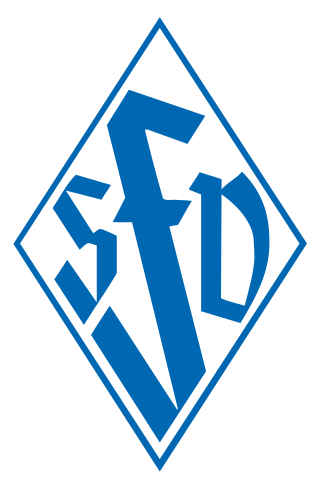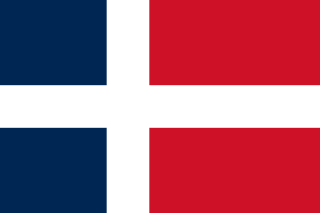
Saarland is a state of Germany in the southwest of the country. With an area of 2,570 km2 (990 sq mi) and population of 990,509 in 2018, it is the smallest German state in area apart from the city-states of Berlin, Bremen, and Hamburg, and the smallest in population apart from Bremen. Saarbrücken is the state capital and largest city; other cities include Neunkirchen and Saarlouis. Saarland is mainly surrounded by the department of Moselle in France to the west and south and the neighboring state of Rhineland-Palatinate in Germany to the north and east; it also shares a small border about 8 kilometres long with the canton of Remich in Luxembourg to the northwest.

Saarbrücken is the capital and largest city of the state of Saarland, Germany. Saarbrücken has 181,959 inhabitants and is Saarland's administrative, commercial and cultural centre. It is located on the Saar River, directly borders the French department of Moselle, and is Germany's second-westernmost state capital after Düsseldorf.
This is a survey of the postage stamps and postal history of the German territory of the Saar. As a border region contested between France and Germany, the Saar has a somewhat complicated philatelic history.

The United Team of Germany was a combined team of athletes from West Germany and East Germany that competed in the 1956, 1960 and 1964 Winter and Summer Olympic Games. In 1956, the team also included athletes from a third Olympic body, the Saarland Olympic Committee, which had sent a separate team in 1952, but in 1956 was in the process of joining the German National Olympic Committee. This process was completed in February 1957 after the admission of Saarland into West Germany.

The Saarland national football team was the association football team representing the Saar Protectorate in international football from 1950 to 1956 during the French occupation following World War II. As France opposed the inclusion of the Saarland in the Federal Republic of Germany until 1956, they administered it separately from Germany as the Saar Protectorate.

The Saar Protectorate, officially Saarland, was a French protectorate and a disputed territory separated from Germany. On joining the Federal Republic of Germany in 1957, it became the smallest "federal state", the Saarland, not counting the "city states" of Berlin, Hamburg, and Bremen. It is named after the Saar River.

1. Fußball-Club Saarbrücken is a German football club based in Saarbrücken, Saarland. The club plays in the 3. Liga, which is the third tier of football in Germany.

The National Olympic Committee (NOC) of the Saarland was founded in the spring of 1950 in the Saar Protectorate, which existed from 1947 to 1956, a region of Western Germany that was occupied in 1945 by France. As a separate team, Saar took part in its sole Olympic Games at the 1952 Summer Olympics before being allowed to rejoin the German team in 1956. Thirty-six competitors, 31 men and five women, took part in 32 events in nine sports.

Fußball-Club 08 Homburg or simply FC Homburg is a German association football club based in Homburg, Saarland, that competes in the Regionalliga Südwest.

The Saar franc was the French franc used as the official currency of the Saar during the times that the Saar territory was economically split off from Germany, in 1920–1935 as the Territory of the Saar Basin, in 1947–1957 as the Saar Protectorate and 1957–1959 as the state of Saarland in West Germany. Local notes and coins were issued during both periods, but the Saar franc was never legally an independent currency.

The Territory of the Saar Basin was a region occupied and governed by the United Kingdom and France from 1920 to 1935 under a League of Nations mandate. It had its own flag : a blue, white, and black horizontal tricolour. The blue and white stood for Bavaria, and white and black for Prussia, out of whose lands the Saar Territory was formed. Initially, the occupation was under the auspices of the Treaty of Versailles. Its population in 1933 was 812,000, and its capital was Saarbrücken. The territory closely corresponds with the modern German state of Saarland, but was slightly smaller in area. After a plebiscite was held in 1935, it was returned to Germany.
SV St. Ingbert is a German association football club from the city of St. Ingbert, Saarland. The club is a successor to Fußball Club Viktoria St. Ingbert established 19 August 1909. Viktoria was joined by FC Bavaria St. Ingbert in 1917. In 1937, a number of local sides were merged to form Verein für Leibesübungen St. Ingbert.
The politics of Saarland takes place within a framework of a federal parliamentary representative democratic republic, where the Federal Government of Germany exercises sovereign rights with certain powers reserved to the states of Germany including Saarland. The state has a multi-party system where the two main parties are the rightist Christian Democratic Union (CDU) and the leftist Social Democratic Party of Germany (SPD).

Hubert Ney was a German politician and Minister President of Saarland (1956). He was born and died in Saarlouis.
Heinrich Welsch was a German politician. He was Minister President of Saarland in 1955 and 1956.
A referendum on the Saar statute was held in the Saar Protectorate on 23 October 1955. The statute would have made the territory an independent polity under the auspices of a European Commissioner, to be appointed by the Council of Ministers of the Western European Union, while remaining in the economic union with France.

Alwin Brück was a German politician who was a member of the Social Democratic Party of Germany (SPD). He was Parliamentary Secretary of the Federal Ministry of Economic Cooperation and Development from 1974 to 1982.

The Saarland national under-18 football team represented the Saar Protectorate at the under-18 age level in men's international football. The team participated in the UEFA European Under-18 Championship between 1953 and 1956. The team ceased to exist in 1957, when control of Saarland was given to West Germany.

Saarlouis is an electoral constituency represented in the Bundestag. It elects one member via first-past-the-post voting. Under the current constituency numbering system, it is designated as constituency 297. It is located in western Saarland, comprising the Merzig-Wadern district and most of the district of Saarlouis district.











